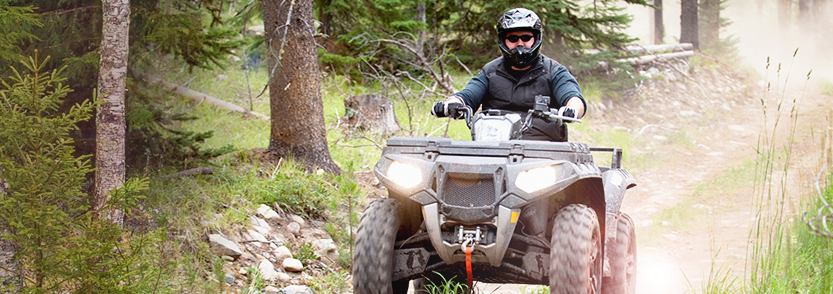 All-terrain vehicles (ATVs) can be an exciting way to enjoy the outdoors. However, as with any motorized vehicle, there is a serious risk of injury if operated incorrectly. The Timiskaming Health Unit area has a rate of emergency department visits for ATV-related injuries almost four times higher than Ontario (212.5 vs 55.1 respectively). In 2020, 61 people from the THU area visited the emergency department for ATV-related injuries. The highest rates of emergency department visits are seen in males and those between the ages of 0-44 years old.
All-terrain vehicles (ATVs) can be an exciting way to enjoy the outdoors. However, as with any motorized vehicle, there is a serious risk of injury if operated incorrectly. The Timiskaming Health Unit area has a rate of emergency department visits for ATV-related injuries almost four times higher than Ontario (212.5 vs 55.1 respectively). In 2020, 61 people from the THU area visited the emergency department for ATV-related injuries. The highest rates of emergency department visits are seen in males and those between the ages of 0-44 years old.
Keep these safety messages in mind when operating your ATV:
- Wear protective gear. For more information, visit Smart Ride Safe Ride ATV/ORV Handbook from the Ministry of Transportation, and Tips for the ATV Rider from the Ontario Federation of ATV Clubs.
- Inspect your ATV before you head out.
- Be prepared – bring a map, GPS system, tool kit, first aid kit, tow rope, flashlight, tire repair kit, high-energy food, and cell phone.
- Know where you are riding before you leave. Tell someone where you are going and when you will return.
- Ride with a partner.
- Follow the rules of the road. Know about Ontario’s laws for ATV use of public roads.
- Do not take passengers on ATVs that are made to carry only one person.
- Ensure that only adults ride adult-sized ATVs, not children.
- Know the risks. ATV-related injuries and fatalities are often due to not wearing a helmet, driving while impaired, excessive speed, on-road riding, and carrying passengers.
- Drive sober. It's against the law to drive while impaired by alcohol or drugs.
- Sign up for a training course.
Resources
Canadian Off-Highway Vehicle Distributors Council
Parents, Youngsters and All Terrain Vehicles
ATV Tips and Practice Guide
Ministry of Transportation
Ontario Federation of ATV Clubs
Parachute Canada
Ontario Medical Association Position Statement on ATV and Children's Safety
20220607/ko:nd